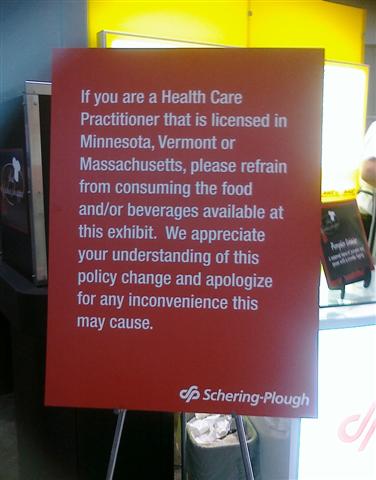“In December, North Carolina state legislators barred sex offenders from coming within 300 feet of any place intended primarily for the use, care or supervision of minors. Three months later, Nichols was arrested at his home after attending Sunday services. He said he was ‘floored’ to learn that he had been picked up because Moncure Baptist Church has a child-care center for families attending services.” [AP/Google] More on sex offender laws: The Economist (“Unjust and ineffective”); Lenore Skenazy (predicate is often teen misconduct with other teens); Radley Balko, Reason (several Georgia offenders told to camp in woods, then told not to); earlier. Related: Oklahoma Citizens for Change.
Archive for 2009
October 10 roundup
- Greenwich, Connecticut real estate board may discipline member whose blog (often linked in this space) regularly pokes fun at overpriced houses. Antitrust/First Amendment problem? [Chris Fountain, For What It’s Worth]
- “Religious group sued for allegedly inciting harm through prayers” [USA Today]
- Legally driven waste of water in parched California should reopen Endangered Species Act debate [Max Schulz, American Spectator] “More Unintended Consequences — Endangered Species Edition” [Ronald Bailey, Reason; related AEI panel]
- “Apple v Woolworth re Apple Logos In Australia” [Trademark Blog]
- Speaking of Australia, Consumers Union’s Consumerist site publishes fake “Aussie McDonald’s fraud plot” memo as real — revises post later, but without mentioning it was taken in by hoax [HardArticle]
- Pennsylvania couple learns about squatter’s-rights law the hard way [Hazleton Standard Speaker]
- Maybe Saratoga Springs, N.Y. will let middle schoolers bike — or even walk! — to school [Albany Times-Union, Lenore Skenazy/Free Range Kids, Patrick at Popehat, Doug Mataconis/Liberty Papers]
- Milberg, the disgraced class action firm of Mel Weiss and Bill Lerach fame, is hot again [NLJ]
Town bans trick-or-treating
“Bob Huggins, a Dunkard Township supervisor, said many local residents agree with town officials that it would be better for local youngsters not to be going door-to-door.” [KDKA Pittsburgh; Ken at Popehat (“To Save Childhood, It Is Necessary To Destroy It”); Dunkard/Bobtown, Greene County, Pennsylvania]
FTC vs. bloggers, cont’d
Excitable bloggers like us ought to calm down, because it’s not as if official crackdowns on the dispensing of freebies ever generate absurd results:  Docblogger White Coat just snapped that picture at the scientific assembly of the American College of Emergency Physicians. (The campaign against drug company freebies for doctors, of course, began with publicity over inducements that were a whole lot more sizable and focused than convention-hall refreshments, but appears to have quickly extended to de minimis courtesies as well).
Docblogger White Coat just snapped that picture at the scientific assembly of the American College of Emergency Physicians. (The campaign against drug company freebies for doctors, of course, began with publicity over inducements that were a whole lot more sizable and focused than convention-hall refreshments, but appears to have quickly extended to de minimis courtesies as well).
Meanwhile, FTC officials are getting all huffy about supposed misunderstandings and misconceptions about their new guidelines. Per PRNewser, some blogs have mistakenly reported the applicable fines as ranging up to $11,000, which is an obsolete number and should in fact be $16,000. Besides which, the commission does not have the authority to impose such fines on its own authority — it has to take its target to court. (Feeling reassured yet?) And FTC assistant director Richard Cleland says the agency does not intend to go after bloggers for nondisclosure standing alone (as opposed, apparently, to nondisclosure in combination with claimed misrepresentation of the qualities of the books, movies, conferences or whatever is being promoted). The main targets of regulation, he stresses, are the publishers or others who dispense the freebies — who of course will have new incentives to protect themselves by controls on distribution, as did Schering-Plough in the sign above.
Something to look forward to, no doubt, in the exhibit hall at future conventions: “If you are a blogger or other Social Media user, please refrain from taking any of the free magazines, calendars or sun visors in this display…” (& welcome Glenn Reynolds/Instapundit readers)
P.S. Coyote:
Anyone who has been involved in NCAA recruiting can tell you the absurd results that flow from defining even tiny freebies as violations. For example, when I interview high school students for Princeton, I have to be careful not to buy them lunch or coffee on the off-chance they turn out to be athletes where such a purchase could trigger a recruiting violation.
And Patrick at Popehat identifies another sort of “endorsement” that might arguably be covered by the language of the guidelines: linking to other blogs, especially when done insincerely.
“Software Patents: A Personal Story”
A story of startups and legal “leverage”, told by Daniel Tunkelang at Noisy Channel (via Pete Warden).
“Criminal Defendant Escapes After Being Mistaken for Lawyer”
And you can ad lib your own punch line to that one [Lowering the Bar]
Lawsuit demands increase in size of U.S. House of Representatives
Tom Freeland at North Mississippi Commentor doesn’t think much of its prospects, though.
Required FTC blogger disclosure
Publishers sometimes send me books in hopes I’ll review or at least mention them. I occasionally attend free advance screenings of new movies (typically law-related documentaries) that filmmakers hope I’ll write about. This site has an Amazon affiliate store which has from time to time provided me with commissions after readers click links and proceed to purchase items, though it’s been almost entirely inactive for years. I get invited to attend the odd institutional banquet whose hosts sometimes give away a free book or paperweight along with the hotel meal. I’ve been sent “cause” T-shirts and law firm/support service provider promotional kits over the years, pretty much a waste of effort since I don’t much care for wearing such T-shirts and am not exactly famed for posts that sing the praises of law firms or their service providers.
Under new Federal Trade Commission guidelines in the works for some time, I could apparently get in trouble for not disclosing these and similarly exciting things. In addition, the commission’s scrutiny will extend to areas less relevant to this site, such as targeted Google advertising and results-not-typical testimonials.
Robert Ambrogi at Legal Blog Watch finds it hard to see why the blogosphere has raised such a big fuss about these rules. After all, the rules (to be precise, “guidelines” backed by government lawyers with relevant enforcement powers) make clear that nondisclosure of a single minor freebie will not in itself suffice to trigger liability but instead will be counted “among several factors to be weighed” in evaluating the continuum of behavior by individuals engaging in social media (it seems the rules also apply to Twitter, Facebook, and guest appearances on talk shows, to name a few). FTC enforcers will engage in their own fact-specific, and inevitably subjective, balancing before deciding whether to press for fines or other penalties: in other words, instead of knowing whether you’re legally vulnerable or not, you get to guess.

Like most authors I know, I wind up donating most review copies I receive to local library sales or other charities. (As Ann Althouse and Cory Doctorow both hint, the accumulation of review copies for disposal quickly becomes more of a burden than otherwise, which is why I spend much more time trying politely to talk publishers out of sending me copies than trying to talk them into it.) But in an extraordinary interview that should be read in its entirety, the FTC’s point man on the rules, Richard Cleland, surreally suggests bloggers should instead return review copies to the publishers — who don’t want them back! — after taking a look.
Among interesting disclosure posts by well-known bloggers: Tyler Cowen/Marginal Revolution, Virginia Postrel/DeepGlamour, Martin Schwimmer/Trademark Blog. Other notable reactions: Jack Shafer, Slate (“The FTC’s mad power grab. … preposterous … The guidelines have to be read to be believed.” ); Patrick at Popehat (“Next on the FTC agenda: fines for hotlinking and failure to hat tip … Yes, I believe in the slippery slope.”); Jeff Jarvis, Amy Alkon, Dan Gillmor (“you get the sense of a government-gone-wild travesty…unworkable in practice”), HIPAA Blog (“unconstitutional”), Washington Examiner (editorial: “No self-respecting journalists should lend their endorsement to [the FTC’s planned Dec. 1-2 workshop on journalism], and neither should any professional journalism organization.”)
Finally, for the last word, Ann Althouse:
The most absurd part of it is the way the FTC is trying to make it okay by assuring us that they will be selective in deciding which writers on the internet to pursue. That is, they’ve deliberately made a grotesquely overbroad rule, enough to sweep so many of us into technical violations, but we’re supposed to feel soothed by the knowledge that government agents will decide who among us gets fined. No, no, no. Overbreadth itself is a problem. And so is selective enforcement.
(& welcome readers from Instapundit, Ron Coleman (who points out that he was on this issue earlier than any of us), ShopFloor, Dave Zincavage, Jonathan Adler/Volokh, Megan MacArdle/The Atlantic, Darleen Click/Protein Wisdom, Declan McCullagh/CBS (with some very kind words), Mickey Kaus (scroll to P.S. “I’d link to…”)). And (10/21): Jason Kottke’s Kottke.org, K2/DaddyTypes.
October 8 roundup
- Judge rules Segways not necessary to accommodation at Disney World, throws out settlement negotiated by disabled rights group [Bloomberg, WSJ Law Blog; background here and here] More: OnPoint News (disputing claims of Disney victory).
- “Too Many Lawyers or Too Many Laws?” [Somin, Volokh, on Scalia; earlier]
- More on the $500K award to woman who escaped first WTC bombing and broke ankle ten days later [John Hochfelder in comments]
- $3 million race bias suit against Martha Stewart Living magazine seems to have followed protest over home furnishing item often described as “coolie-hat” lampshade [NY Post]
- Skyboxes for the mayor and city councilors who approved the stadium — and this is ethically OK? [Coyote]
- Getting kind of meta: “Lawyer Says Lawyer Defamed Him in Press Release About Defamation Suit” [NLJ]
- “Free credit score” firm backs off legal effort to identify critical blogger — but who’s this they’ve identified as their foe? [Paul Levy, Consumer Law & Policy, Felix Salmon, earlier]
- EEOC says Catholic college “discriminated against women by removing coverage for prescription contraceptives from [its] health insurance plan” [Gaston, N.C. Gazette via LaborProf]
“Perjury For Filing A Writ Of Habeas Corpus?”
Texas, KXAN: “A Liberty Hill man faces life in prison for aggravated perjury charges after claiming he was innocent following a plea bargain with the Williamson County District Attorney’s Office.” He’s now been found guilty. Jamie Spencer at Austin Criminal Defense Lawyer scents a prosecutorial grasp for advantage.
Also on the topic of plea bargains, Scott Greenfield has some thoughts on the coerciveness of the process.
